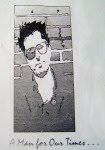Recently in an internet recording forum, someone asked about an old Radio Shack mic they had found, asking what it might be good for, getting a range of responses. Mine was:
You can use it for anything it works for you for. (Sorry about that awkward preposition stack.)To that, someone replied "Well said..." and I added:
By that I mean to suggest that the best way to figure out what it's good for is to explore its use yourself.
The rest of us here don't have this mic in their hands and probably have never used one, and while some might feel like they can make a summary judgment about the mic without actually knowing anything about it, based solely on its Rat Shack origins, I would say the best way to find out about it is to use and experiment with it.
That said, as you might surmise from others' comments, there's reason to believe based on the usual run of Realistic/Radio Shack products that it is highly unlikely to be what most of us might consider a good mic. But it might well be the perfect mic for some specific use.
First person experimentation and exploration the best way to learn about different mics.
I basically say the same couple of things over and over, so I've refined my message to some extent.
The internet makes it much easier to get a recording education (which is great because the explosion of super-cheap recording gear has meant an explosion in home recording by multiple factors of ten... much like the introduction of the simple box camera a century or so ago put photography in hands of regular joes and janes).
But it also has made it easier for understandably overwhelmed newbs to get bobbled and just throw up their hands and post myriad variations on the perennial Just tell me what to do! post. (Just tell me what preamp/mic/compressor/DAW/etc... How do I get the sound of this record? How do I make my recordings/mixes sound less small? How do I...? Etc.)
And it's my thinking that this is a Give a man a loaf of bread and he eats for a day; teach a man to fish and he eats for a lifetime kind of thing.
It is confusing and frustrating. But a lot of learning -- even for those going to school to learn recording (my advice: go to an affordable community collge; make sure you have a viable day job, you're going to need it) simply comes down to working and experience, trial and error and other experimentation.
I did go to school to study recording -- but what I was really doing was going to school to get access to recording gear and it was observation and direct experience which mostly taught me. (Good thing, too, since a year or so after I started, I, the teacher, and a few others from the recording program went to a nearby community college with a well-established program with a very good rep -- this was the early 80s and there were few -- and we all took the entrance test that would weed the several hundred applicants down to the 50 or so who would be admitted to the program. Both my teacher and I passed, though others did not. But I bested my teacher's score on the entrance test to the other school by more than a few points. A nice guy in many ways, he thought he knew more than he did. And it showed when he did things like try to teach people to mix with trim pots instead of faders.)



0 Comments:
Post a Comment
Subscribe to Post Comments [Atom]
<< Home